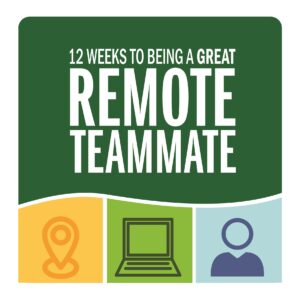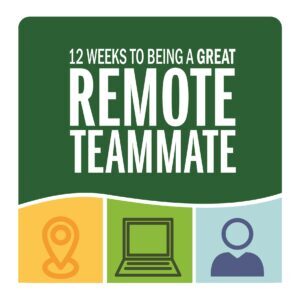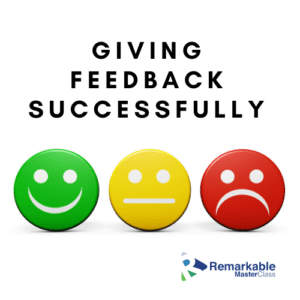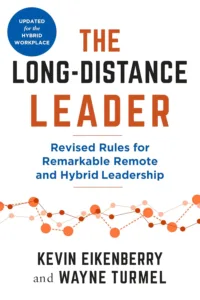Are You Simply “Working from Home”? Or Are You Making a Difference as a Member of a Remote Team?
There is a big difference between working from home and contributing and making a difference as a member of a remote team. And that difference matters to you, to the people you work with (even if you don’t see them every day), and to the organization that pays you.
For many of you, your workplace has changed significantly. Maybe remote work was thrust on you – you didn’t expect it or want it. Or maybe you’ve been angling for the chance to eliminate your commute and work remotely, so your new situation was a welcome change. Either way, it doesn’t take long to learn that working remotely is different in ways you weren’t expecting or prepared for.
I know, you are probably hanging in there – for the most part, the work is getting done…most days.
Is Virtual Work What You Expected?
Maybe you thought knocking off your commute and simplifying your morning routine would make life easier? But what about the stress level? Higher than you thought, isn’t it?
What about the uncertainty? You wonder if you are doing the right things, you wonder if the work you are doing is making a difference or not.
What about all the time you thought you would get back in your life? With no commute, you thought this would be great. Why is it that you seem to be working more hours than ever?
You even miss some of the things you used to think of as distractions – like the occasional breakroom chat about the weekend, or the person stopping by your office with their coffee for a chat.
So now you are working from home – but every day you feel a bit more isolated and a bit less connected. Are you worried at all about your place in the pecking order, or the future of the organization or even the future of your role?
You may be working alone, but if you are asking yourself any of these questions, having any of these feelings, you are not alone.
It is natural.
While that might be a bit comforting to know you aren’t alone, it doesn’t make you more effective, it doesn’t lower your anxiety and it doesn’t keep you from wondering how you can be more effective with less stress and uncertainty.
It Doesn’t Have to Be this Way!
You can be more effective.
You can have less stress.
You can accomplish more individually.
You can feel more connected and be more confident that you are making a difference in your work.
You likely have a small wish list of the things you think might help achieve what we have been talking about, and some of that list, we bet falls on something you want or need someone else do to.
“If they would just…”
“If my boss would just…”
Let’s be clear. You can’t make them do anything. But there are things that you can do that might influence them. And while it would be nice to wave a magic wand and have someone “fix it all”, we know that doesn’t exist and that if we want to make things better for us as a remote worker, part of it belongs to us.
What if you had a tool kit that would help you know what to do – the small tweaks that would start to change your results, make you more confident and reduce your worry and stress? And what if that same toolkit might help you shift the attitudes and behaviors of others too?
If you had that toolkit would you breathe a little easier and would you feel better about today and tomorrow (and the rest of your career)?
A Peek Into Your Remote Work Toolkit
Introducing 12 Weeks to Being a Great Remote Teammate. This is a set of tools to help you move from surviving with your computer at home to being an integral part of a successful team – even when you don’t see those team members everyday (except perhaps on a Zoom call). It is a complete blended learning toolkit that contains:
- Worksheets and assessment that will guide you and that you can use anytime you need support.
- Short, on-demand learning sessions with the experts to help you understand and be able to apply each new skill you are putting into your new toolkit
- Reminders and reinforcements that you can use to help you succeed in real-life remote work.
The best toolkits help you keep things separated and neat but have everything you need in one place. When you know which tools to use and when, your toolkit becomes invaluable and you always want it by your side. 12 Weeks to Being a Great Remote Teammate gives you a…
- Big picture view of success – when you have the blueprints, fixing and improving anything is easier.
- Plan so you can be engaged and excited about your wok and how you can contribute to the success of the overall efforts of the team.
- Roadmap for your long-term future – so that remote work is a stepping stone not a stumbling block to your long-term professional goals.
- Set of steps to build more effective, productive and meaningful working relationships with your teammates – even those you don’t see in person.
- Way to work with others remotely, rather than working around or in spite of them.
- Approach for communicating with others while working remotely. And no, email isn’t the full answer!
- Way to build trust, yes build, even when working at a distance.
- Way to give and receive feedback – which is so often missing in a work from home environment.
- Chance to have successful, productive virtual meetings (yes, it is possible) – whether you are leading or participating in them.
- Way to be more connected with the full organization – even when you feel so isolated.
- Picture of what it looks like to be more productive and proactive – for yourself and the full team.
- Plan to feel less alone and more connected – and still have the benefits of working from home.
Specifically, you will get:
- A weekly video from Wayne or Kevin introducing the week’s theme
- A 30-minute recorded webinar full of tips and best practices so you can improve in the theme of the week.
- A piece of downloadable written content in PDF format. This might be a relevant article, a checklist, or an assessment.
- A daily text reminder about important concepts from each week’s theme and a weekly email to help you stay on track and create a habit of learning.
This is learning without lecture, learning that doesn’t require get in your car or even schedule a specific time like so many of the virtual meetings you have to attend.
The 12-Week Curriculum
- Week 1: A Model for Successful Remote Work: We’ll introduce the “3 P Model” – a critical component for remote teamwork success.
- Week 2: Being an Engaged Remote Worker: Engagement is more than satisfaction. It is a social and mental connection to the work, your teammates and your long-term success.
- Week 3: Remote Work and Your Future: Keeping you head down and staying invisible won’t help you in the long run. You’ll learn the concept of “Ethical Visibility” to help you stay a visible and critical part of the team no matter where you are.
- Week 4: Building Relationships Remotely: Building productive, pleasant work relationships is even more difficult at a distance. You’ll learn how to be proactive and intentional in making building bridges that increase both productivity and satisfaction.
- Week 5: How to Work with Others Remotely: This session will reveal the 3 keys to great remote teamwork.
- Week 6: Communicating Remotely: Communication must be clear, targeted and delivered in the right way using the right tools for the intended audience. You’ll learn tips and techniques for clear remote communication.
- Week 7: Building Trust Remotely: Trust is often harder to maintain when you work apart. You’ll learn how to be mindful about giving others the evidence they need to trust you, and how to get what you need to work well with your teammates.
- Week 8: Giving and Receiving Feedback: One of the most important things that separate team members from great teammates is the ability to give and receive feedback. You’ll learn rules for offering and hearing feedback from others, no matter your position on the team.
- Week 9: Meetings and Your Role: Virtual meetings are a critical part of a remote teammate’s life, but too often they aren’t useful, and people feel lost and unheard. This session will help you learn how to be a great meeting participant.
- Week 10: The Organization and You: Work in a vacuum can, over time, become draining and demoralizing. You’ll learn how to understand the big picture of what your team does, and your role in its success, helping to make the work more engaging and satisfying.
- Week 11: The Power of Proactivity: What separates great teammates from mere team members is being proactive. Proactivity is more than just working without being told, it’s also speaking up and offering assistance even when others may not ask.
- Week 12: Balancing Work and Team Tasks: Getting your work done is important, but setting priorities so that you do the right work to help the entire team is critical to being a great teammate.




